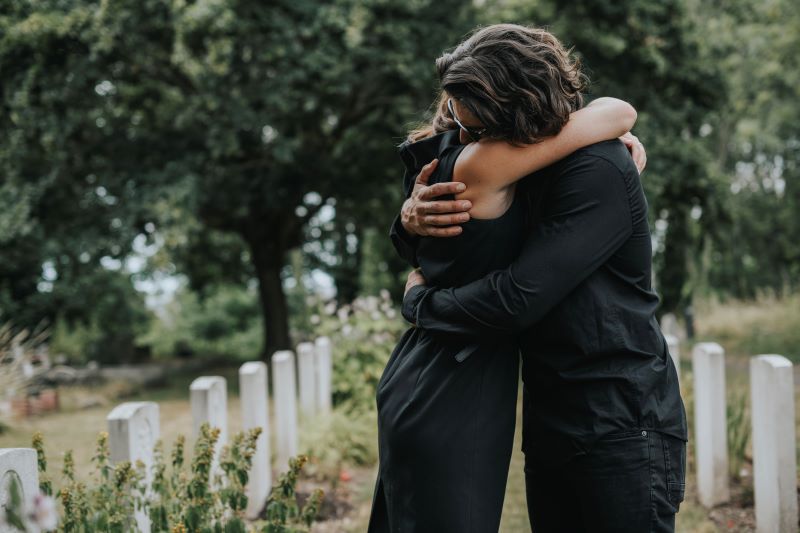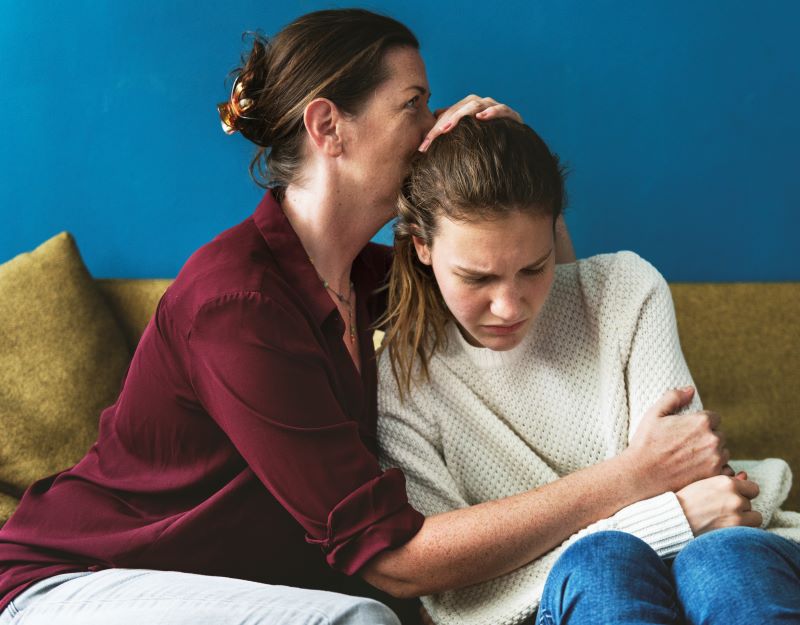How to Speak With Relatives About Family Death
One of the most challenging experiences that anyone will feel is losing a family fellow member. In most cases, people share close bonds and attachments with their relatives. The credible severing of that bond via death is something that many people struggle with. To say that a loss of a family fellow member is tough would be the understatementof the century.
One of the most important decisions someone will ever make is determining how to bargain with losing someone they cared for. While some people choose to laurels the deceased relative, other people may grieve by taking time for themselves and remembering the legacy of the recently departed. Unfortunately, not everyone handles grief constructively or healthily. Certain individuals choose to lash out at others, alienate people, and engage in other cocky-destructive practices. In sure scenarios, the behaviors above are due to an unawareness of how to bargain with a expiry in the family.

Source: rawpixel.com
Addressing the Decease
Truly accepting the loss of a loved one is very painful; some people become afraid to accept the death truly. Throwing oneself into piece of work, declining to hash out the recently deceased relative, and otherwise preoccupying oneself with other matters are some of the most common forms of purposeful distraction. Many people genuinely believe that engaging in the preceding behaviors will help them move frontwards.
Mental Wellness America explains the importance of allowingoneself to feel all the feelings which accompany the loss of a family member. Some of the almost common emotions are anger, guilt, despair, shock, disbelief, confusion, and even denial. These feelings are healthy; processing them takes time and is not an experience which can exist rushed. Failure to accept the passing of the relative and experience the reactions higher up can prompt emotional, psychological, and even concrete issues.
The 5 Stages of Grief
Individuals who feel a death in the family unit volition likely experience the five stages of grief. The 5 stages of grief are denial, anger, bargaining, depression, and acceptance. Each person will experience the preceding stages at their own pace; the grieving procedure can accept weeks, months, or even years. There is no 1 formula or timetable. The closeness one shared with the recently deceased is likewise a disquisitional factor; about people have longer amounts of time to mourn loved ones with whom they shared a connectedness…and that's OK.
Deprival

Source: rawpixel.com
As the initial phase of grief, denial occurs as an internal defense mechanism. On some level, the individual knows their relative has passed, just deprival arises to assistance people survive and not go completely broken by the loss. Despite the naturalness of this starting time stage of grief, denial is problematic when someone does non eventually overcome thefeeling. Gradual acceptance that a relative has passed is very important. Remaining in denial over a death in the family unit can lead to very severe issues in other parts of one's life.
Acrimony
Following denial isanger. Anger after the loss of a relative tin can come up in many forms and be directed towards a variety of individuals. Sometimes, people feel angry with themselves for not maxim or doing something earlier their family member passed away. Anger can also be directed towards other relatives, friends, the world, medical staff who tended to the recently deceased in their final days, and fifty-fifty towards the dead relative. The event which prompted the death of a family member can also contribute to the extent and longevity of a grieving person's anger.
Although anger is an innate office of dealing with a death in the family, constructively managing this emotion is paramount. Some people practice, spend fourth dimension in nature, hit a battle purse, or engage in relaxing activities which let the release of anger. Similar to deprival, anger can get quite dangerous when someone holds onto information technology. Ongoing anger will not bring back a dead relative, but, left unchecked, anger does have the power to ruin the lives of those who are even so living. At some point, grieving individuals must effigy out how to move past anger.
Bargaining
Later on one has experienced denial and anger, the next, almost common stage of grief is bargaining. In about cases, bargaining comes in the course of a sort of truce, such as "I'll do anything to bring them back." Bargaining is also a way of attempting to escape the natural strain which anger and grief wreak upon the body. Although nix tin bring back the dead, bargaining is still a natural response to feeling saddened and overwhelmed past the loss of a family member. People may too go through the hypothetical "what ifs" during the bargaining stage, for example past asking themselves, "What if I'd been in that location?" The longevity of the bargaining phase varies from person to person.
Low

Source: rawpixel.com
As people work their mode through the grieving procedure, they may feel depression. The loss of a relative tin can engender feelings of emptiness, sadness, and even an contradistinct outlook on life. During this fourth dimension, it'southward very of import for individuals to take time for themselves, process their feelings, and heal. Talking with others who tin sympathise is often helpful, although some people find information technology best to be lonely and process matters at their own pace.
While low is a natural office of the grieving process, it can yet go dangerous if it lasts for too long. Taking fourth dimension for oneself is fine, but habitual alienation from other people is not salubrious. If depression maintains or reaches extreme levels, seeking help is imperative. Depression is linked to a plethora of concrete, emotional, and psychological problems. Depression later the loss of a relative generally follows equally 1 begins to consciously come to the realization that their loved one is gone forever.
Acceptance
Acceptance is the final stage of grief and occurs when one realizes that their relative is gone and nothing can bring them dorsum. Many people mistake acceptance with the completion of the grieving process; notwithstanding, accepting the loss of a loved ane does non erase the pain. Individuals can accept something, yetremain displeased. Many people who have reached the final phase of grief attempt to move on with their lives while keeping their relative in their hearts and memories. This may include returning to work, immersing themselves in hobbies, and otherwise living their lives and attempting to be happy again. The by cannot exist inverse. A critical part of dealing with a death in the family requires acceptance.
Moving On With Life

Source: rawpixel.com
Different people have different ideas on what information technology means to move on with life. For some, information technology means getting back into ane'south daily grind. For others, moving on involves prayer, reaching out to others, and working so that grief is less emotionally taxing or draining. There are as well many misconceptions nigh moving forward; doing this does non mean forgetting the loss of a relative or never acknowledging information technology. Many people visit the graves of their loved ones to honor them, leave flowers, and pay tribute. Others go along pictures of the recently departed in their homes or at their work offices. While each can move on with life in his or her way, doing so is a crucial part of dealing with a death in the family.
Seeking Professional person Help
Seeking professional help is ane of the best ways for people to work through the stages of grief and somewhen movement on with their lives. Unfortunately, this is nonetheless something which many people struggle with. In some cases, a grieving person may not be in the mood to talk with anyone. In the earliest stages of loss and grief, mere discussions of the death can be upsetting and even do more harm than good. Nevertheless, many individuals have found that subsequently some time, talking with others can help. Conversing with other human beings provides a release that doesn't exist when thoughts and feelings are bottled upwardly.
In that location is an increasingly large corporeality of inquiry suggesting that online therapy tin aid those who are experiencing complicated problems, such every bit grief or trauma, after the death of a loved one. For case, in a comprehensivereview in Frontiers in Psychiatry, the effects of online bereavement care were examined. Researchers collected the results from seven studies, all of which utilized cognitive-behavioral therapy (CBT). Researchers found that there were significant positive effects for symptoms of grief. Cognitive-behavioral therapy works by helping individuals empathise and replace negative, intrusive thoughts that can pb to unwanted emotions, such every bit grief.
Equally outlined in a higher place, online counseling can be a useful method of treatment when you're confronting difficult-to-process emotions related to grief. If you are not still set to discuss this issue face to face, online therapy is a more private option. With BetterHelp, you lot'll be able to participate in therapy from the comfort of your home, without having to go to an office or discuss your treatment with anyone but your advisor. A licensed counselor can help you manage your emotions equally you piece of work through the grief of losing a loved one. Read below for reviews of BetterHelp counselors, from those who take experienced similar issues.
Counselor Reviews
"Afterwards the unexpected loss of my male parent, a friend of mine suggested BetterHelp. Regina has been a key component in my grief recovery. With her guidance, I now feel like I have the tools I demand to become through this on my own. Give thanks you for everything."

"Rochelle helped me through a very night perod in my life this past leap following the unexpected and tragic loss of my mother. Losing someone is never easy, and loss during a pandemic is magnified. I am in a healthy place today considering I sought out help, and Rochelle was there to provide it for me."

Conclusion
Although we all take things to piece of work through, nosotros do non accept to work through them alone. Help volition e'er be available for those who enquire. Dealing with a death in the family or other traumatic experiences is not a process which should exist rushed. Whether you're working through the loss of a relative or going through something else, know that you are not alone.
Source: https://www.betterhelp.com/advice/family/how-to-deal-with-a-death-in-the-family/